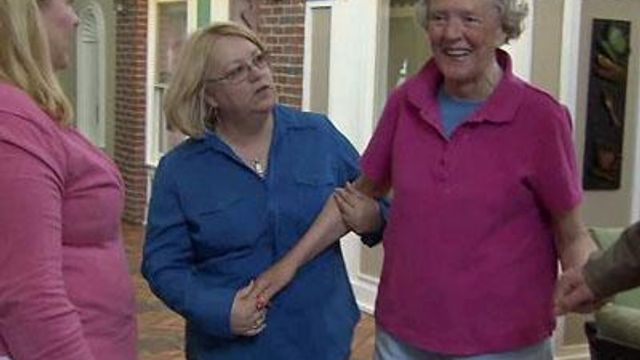Mother's disease takes emotional, financial toll on Raleigh man
A few years ago, Lois "Lo Lo" Shoolbred's family saw the signs. Her memory was slipping and her health problems started to compound, but her loved ones didn't see the enormity of her Alzheimer's disease.
Posted — Updated“My family and I were definitely caught off guard,” said Dave Simpson, Shoolbred’s son.
Like many families dealing with an aging parent, Simpson faced an avalanche of tough decisions. He took over his mother's finances and moved her into his Raleigh home.
“Lo Lo would turn on our lights in our room, looking scared, lost and alone. We would try to calm her down and put her back to bed, but it wasn’t long before she was up again, wandering through our house and calling our names," he said.
Simpson struggled as he moved his mother into three assisted living facilities before finding a fit at Clarebridge Memory Care in Cary.
“You have a very stressful, emotional situation on top of a very complicated business situation that you have to crank into a maze of bureaucracy,” he said.
Gregory Wallace, a Raleigh attorney who specializes in helping families prepare for that financial and health care maze, says good advice and good information are extremely important. Many people come to him too late, he says.
While every person's situation is different, Wallace says, planning is essential. He first recommends families work out power of attorney and determine who will handle financial and health care questions.
Consider whether long-term care insurance makes sense, and before transferring property and savings to family, make sure to get good counseling to avoid government penalties.
“If you're going to make significant transfers of assets, you really need to think about doing it five years before you might need a nursing home,” Wallace said.
In Simpson’s case, he learned through struggle. For years, his mother paid for long-term care insurance, but then, right as she was getting sicker, she let it lapse.
“I did not realize that she didn't have the coverage. It was not told to me,” said Simpson, who paid thousands of dollars in out-of-pocket expenses.
Every month, Simpson pays $5,200 for his mother to stay at Clarebridge, not including prescriptions and other expenses. Her Social Security and pension cover less than half the costs.
“These incredibly high fees are gobbling up her savings like piranhas,” Simpson said.
Not all days are good for Shoolbred as she battles dementia, but even as her care drains her savings, her son tries to focus on the moment, not the money.
“The upside is, if Lo Lo lives and burns out her savings, that's more time with us,” Simpson said.
• Credits
Copyright 2024 by Capitol Broadcasting Company. All rights reserved. This material may not be published, broadcast, rewritten or redistributed.






